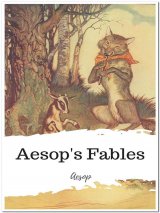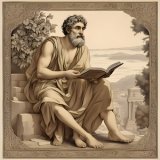Aesop's Fables Page #8
Aesop's Fables, or the Aesopica, is a collection of fables credited to Aesop, a slave and storyteller believed to have lived in ancient Greece between 620 and 564 BCE.
Utility is most men's test of worth. THE JACKDAW AND THE PIGEONS A Jackdaw, watching some Pigeons in a farmyard, was filled with envy when he saw how well they were fed, and determined to disguise himself as one of them, in order to secure a share of the good things they enjoyed. So he painted himself white from head to foot and joined the flock; and, so long as he was silent, they never suspected that he was not a pigeon like themselves. But one day he was unwise enough to start chattering, when they at once saw through his disguise and pecked him so unmercifully that he was glad to escape and join his own kind again. But the other jackdaws did not recognise him in his white dress, and would not let him feed with them, but drove him away: and so he became a homeless wanderer for his pains. JUPITER AND THE TORTOISE Jupiter was about to marry a wife, and determined to celebrate the event by inviting all the animals to a banquet. They all came except the Tortoise, who did not put in an appearance, much to Jupiter's surprise. So when he next saw the Tortoise he asked him why he had not been at the banquet. "I don't care for going out," said the Tortoise; "there's no place like home." Jupiter was so much annoyed by this reply that he decreed that from that time forth the Tortoise should carry his house upon his back, and never be able to get away from home even if he wished to. THE DOG IN THE MANGER A Dog was lying in a Manger on the hay which had been put there for the cattle, and when they came and tried to eat, he growled and snapped at them and wouldn't let them get at their food. "What a selfish beast," said one of them to his companions; "he can't eat himself and yet he won't let those eat who can." THE TWO BAGS Every man carries Two Bags about with him, one in front and one behind, and both are packed full of faults. The Bag in front contains his neighbours' faults, the one behind his own. Hence it is that men do not see their own faults, but never fail to see those of others. THE OXEN AND THE AXLETREES A pair of Oxen were drawing a heavily loaded waggon along the highway, and, as they tugged and strained at the yoke, the Axletrees creaked and groaned terribly. This was too much for the Oxen, who turned round indignantly and said, "Hullo, you there! Why do you make such a noise when we do all the work?" They complain most who suffer least. THE BOY AND THE FILBERTS A Boy put his hand into a jar of Filberts, and grasped as many as his fist could possibly hold. But when he tried to pull it out again, he found he couldn't do so, for the neck of the jar was too small to allow of the passage of so large a handful. Unwilling to lose his nuts but unable to withdraw his hand, he burst into tears. A bystander, who saw where the trouble lay, said to him, "Come, my boy, don't be so greedy: be content with half the amount, and you'll be able to get your hand out without difficulty." Do not attempt too much at once. THE FROGS ASKING FOR A KING Time was when the Frogs were discontented because they had no one to rule over them: so they sent a deputation to Jupiter to ask him to give them a King. Jupiter, despising the folly of their request, cast a log into the pool where they lived, and said that that should be their King. The Frogs were terrified at first by the splash, and scuttled away into the deepest parts of the pool; but by and by, when they saw that the log remained motionless, one by one they ventured to the surface again, and before long, growing bolder, they began to feel such contempt for it that they even took to sitting upon it. Thinking that a King of that sort was an insult to their dignity, they sent to Jupiter a second time, and begged him to take away the sluggish King he had given them, and to give them another and a better one. Jupiter, annoyed at being pestered in this way, sent a Stork to rule over them, who no sooner arrived among them than he began to catch and eat the Frogs as fast as he could. THE OLIVE-TREE AND THE FIG-TREE An Olive-tree taunted a Fig-tree with the loss of her leaves at a certain season of the year. "You," she said, "lose your leaves every autumn, and are bare till the spring: whereas I, as you see, remain green and flourishing all the year round." Soon afterwards there came a heavy fall of snow, which settled on the leaves of the Olive so that she bent and broke under the weight; but the flakes fell harmlessly through the bare branches of the Fig, which survived to bear many another crop. THE LION AND THE BOAR One hot and thirsty day in the height of summer a Lion and a Boar came down to a little spring at the same moment to drink. In a trice they were quarrelling as to who should drink first. The quarrel soon became a fight and they attacked one another with the utmost fury. Presently, stopping for a moment to take breath, they saw some vultures seated on a rock above evidently waiting for one of them to be killed, when they would fly down and feed upon the carcase. The sight sobered them at once, and they made up their quarrel, saying, "We had much better be friends than fight and be eaten by vultures." THE WALNUT-TREE A Walnut-tree, which grew by the roadside, bore every year a plentiful crop of nuts. Every one who passed by pelted its branches with sticks and stones, in order to bring down the fruit, and the tree suffered severely. "It is hard," it cried, "that the very persons who enjoy my fruit should thus reward me with insults and blows." THE MAN AND THE LION A Man and a Lion were companions on a journey, and in the course of conversation they began to boast about their prowess, and each claimed to be superior to the other in strength and courage. They were still arguing with some heat when they came to a cross-road where there was a statue of a Man strangling a Lion. "There!" said the Man triumphantly, "look at that! Doesn't that prove to you that we are stronger than you?" "Not so fast, my friend," said the Lion: "that is only your view of the case. If we Lions could make statues, you may be sure that in most of them you would see the Man underneath." There are two sides to every question. THE TORTOISE AND THE EAGLE
Translation
Translate and read this book in other languages:
Select another language:
- - Select -
- 简体中文 (Chinese - Simplified)
- 繁體中文 (Chinese - Traditional)
- Español (Spanish)
- Esperanto (Esperanto)
- 日本語 (Japanese)
- Português (Portuguese)
- Deutsch (German)
- العربية (Arabic)
- Français (French)
- Русский (Russian)
- ಕನ್ನಡ (Kannada)
- 한국어 (Korean)
- עברית (Hebrew)
- Gaeilge (Irish)
- Українська (Ukrainian)
- اردو (Urdu)
- Magyar (Hungarian)
- मानक हिन्दी (Hindi)
- Indonesia (Indonesian)
- Italiano (Italian)
- தமிழ் (Tamil)
- Türkçe (Turkish)
- తెలుగు (Telugu)
- ภาษาไทย (Thai)
- Tiếng Việt (Vietnamese)
- Čeština (Czech)
- Polski (Polish)
- Bahasa Indonesia (Indonesian)
- Românește (Romanian)
- Nederlands (Dutch)
- Ελληνικά (Greek)
- Latinum (Latin)
- Svenska (Swedish)
- Dansk (Danish)
- Suomi (Finnish)
- فارسی (Persian)
- ייִדיש (Yiddish)
- հայերեն (Armenian)
- Norsk (Norwegian)
- English (English)
Citation
Use the citation below to add this book to your bibliography:
Style:MLAChicagoAPA
"Aesop's Fables Books." Literature.com. STANDS4 LLC, 2025. Web. 10 Jan. 2025. <https://www.literature.com/book/aesop%27s_fables_316>.




Discuss this Aesop's Fables book with the community:
Report Comment
We're doing our best to make sure our content is useful, accurate and safe.
If by any chance you spot an inappropriate comment while navigating through our website please use this form to let us know, and we'll take care of it shortly.
Attachment
You need to be logged in to favorite.
Log In